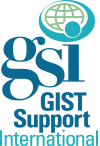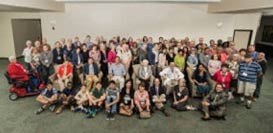In Italy: 4th national meeting of A.I.G. (Associazione Italiana GIST)
On February 26, 2011 A.I.G. (Associazione Italiana GIST) held its 4th national meeting for GIST patients at Fondazione IRCCS Istituto Nazionale dei Tumori in Milan. The focus points of the meeting were:
• What are gastrointestinal stromal tumors? And
• How to treat GIST?
 |
| Anna Costato, Chairwoman of AIG, and Dr. Paolo Casali |
Dr. Paolo Casali, the head of the Sarcoma Department at INT in Milan, discussed “The time-course of disease in patients with GIST: what has changed in the last 10 years and what could change next.” For future research on GIST there are things happening that years ago no one thought could be done, said Dr. Casali. Collaborative networking is important for research in oncology, and the tissue banks may be very important. Patient associations will be involved in the management of the banks themselves and in the studies that will be performed on those tissues.
 |
| Dr. Alessandro Gronchi |
 |
| Dr. Elena Fumagelli |
Dr. Alessandro Gronchi, surgeon at INT in Milan, focused on "From diagnosis to treatment from the standpoint of surgery.”
Dr. Elena Fumagalli, oncologist at INT in Milan, discussed the issue of drug therapies and management of side effects of targeted therapy.
In the second session we introduced an absolute novelty: a live conference call with experts from some referral centers for GIST in Italy, to take stock of the situation on the research on GIST. Dr. Paolo Casali has discussed with his colleagues from Bologna (Dr. Guido Biasco, and Dr. Maria Pantaleo – University of Bologna, Policlinic Suor Orsola Malpighi,) from Florence (Dr. Silvia Gasperoni, AOU Careggi), from Palermo (Dr. Giuseppe Badalamenti, Policlinic P. Giaccone), from Ancona (Dr. Raffaella Bracci, AOU Umberto I Torrette), from Rome (Dr. Bruno Vincenzi, University Biomedical Campus), and patients and family members attending the meeting have been involved in the discussion.
Of great interest were the topics discussed, such as pre-clinical and translational research, the importance of a referral center for rare diseases such as GIST, and what the patient organization can do to assist research.
The clinicians were pleased to answer all of the patients’ questions regarding medical therapy in advanced disease, side effects management, follow-up, role of imaging, stress management of GIST patients, and approaches against drug resistance. Their contribution was greatly appreciated by the audience.
Gabriella Tedone
A.I.G. Associazione Italiana GIST ONLUS


